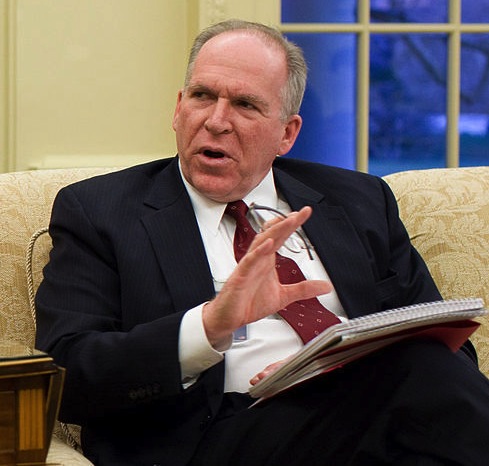In a speech at the Council on Foreign Relations on Wednesday, White House counterterrorism chief John Brennan tried to defend America’s policies toward Yemen by downplaying the largely secret war the Obama administration is waging there.
 Brennan’s speech was the Obama administration’s response to a five-page letter sent to the President last month from more than two dozens top foreign policy experts warning that US policy towards Yemen was becoming too militarized.
Brennan’s speech was the Obama administration’s response to a five-page letter sent to the President last month from more than two dozens top foreign policy experts warning that US policy towards Yemen was becoming too militarized.
In Brennan’s public relations retort, he noted that more than half of the $337 million Washington sent to Yemen this year is for political transition, humanitarian assistance and development. “In fact, this is the largest amount of civilian assistance the United States has ever provided to Yemen. So any suggestion that our policy toward Yemen is dominated by our security and counterterrorism efforts is simply not true,” Brennan said.
Foreign aid slated as development assistance notoriously gets used by corrupt and brutal regimes, like the one in Yemen, for purposes other than humanitarian development. Besides, all Brennan’s point did was make clear the US is nation building in Yemen, minus tens of thousands of occupying troops.
The fact that the US helped lead a political transition in Yemen from the previous puppet dictator, Ali Abdullah Saleh, to one of his no-less-dictatorial deputies, Abdrabuh Mansur Hadi, should make clear Washington isn’t aiming for democratic reforms.
“Brennan took pains to describe President Obama’s approach to Yemen as a giant development effort — although it’s the type of economic improvement initiative that involves robots of death circling overhead,” writes Spencer Ackerman at Wired‘s Danger Room.
Brennan also downplayed the fact that the US has increased the aid to Yemen’s military and is bombing Yemen on a regular basis, mostly from remote-controlled drones. In April, President Obama approved the use of “signature strikes,” which permit bombing people in Yemen even when the identities of the targets aren’t known.
Brennan then further denied the potential for blowback. “We see little evidence that these actions are generating widespread anti-American sentiment or recruits for AQAP. In fact, we see the opposite. Our Yemeni partners are more eager to work with us. Yemeni citizens who have been freed from the hellish grip of AQAP are more eager, not less, to work with the Yemeni government,” Brennan said.
But experts disagree. Gregory Johnsen, a Yemen expert at Princeton University, recently wrote, “I would argue that U.S. missile strike[s] are actually one of the major — not the only, but a major — factor in AQAP’s growing strength.”
Johnson responded to Brennan’s speech in a tweet: “The idea that the deaths of civilians in Yemen doesn’t lead to recruits to AQAP is either deliberately negligent or incredibly naive.” He added: “I think the US is, at least publicly, drastically underestimating blow back and revenge coming from Yemen.”
As Barbara Bodine, a former US ambassador to Yemen, has noted, “Right now we don’t have a Pakistan-like reaction [to drones]. But at first we didn’t have that reaction with Pakistan either. This is something that builds.”
When reporters from National Public Radio visited Yemen to speak with civilian victims of drone strikes, they wrote that children of a man killed by a drone strike in Yemen “say they want to fight against those who killed their father, namely against America.” The eldest son had already formally joined Ansar al Sharia, an al-Qaeda-linked group, to avenge his father’s death, NPR reported.
In May, the Washington Post found “evidence of radicalization emerged in more than 20 interviews with tribal leaders, victims’ relatives, human rights activists and officials from four provinces in southern Yemen where U.S. strikes have targeted suspected militants. They described a strong shift in sentiment toward militants affiliated with the transnational network’s most active wing, al-Qaeda in the Arabian Peninsula, or AQAP.”
Brennan’s speech was the latest attempt by the Obama administration to hide its largely secret war in Yemen and to paper over the very dangerous consequences it appears to be reaping.


